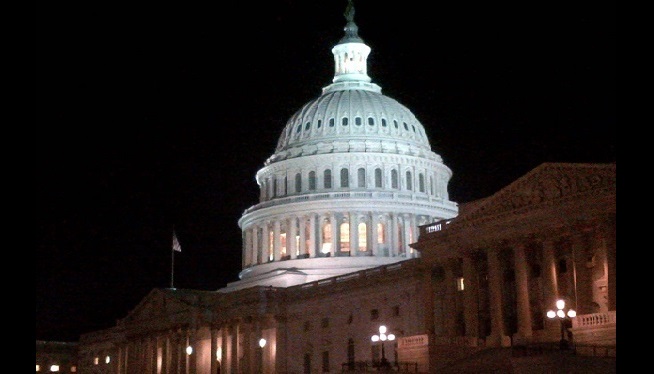WASHINGTON (AP) — There were questions about quid pro quos and whistleblowers, the Constitution and an unpublished book.
Senators in President Donald Trump’s impeachment trial posed dozens of questions to White House lawyers and to House Democrats prosecuting the case. The questions, written on paper and read aloud by Chief Justice John Roberts, provided a window into the thinking of senators who until now had been silent inside the chamber.
A look at some of the more notable exchanges:
____
SEN. CHUCK SCHUMER, D-N.Y.: “Is there any way for the Senate to render a fully informed verdict in this case without hearing the testimony of Bolton, Mulvaney and the other key eyewitnesses, or without seeing the relevant documentary evidence?”
— This was the first Democratic question of the evening and it encapsulated the principal unresolved issue of the impeachment trial: Will there be enough votes to allow witnesses?
Democrats are clamoring to hear from John Bolton, the former Trump administration national security adviser who writes in a forthcoming book that Trump wanted to withhold military aid from Ukraine until it helped with investigations into Democratic presidential candidate Joe Biden. They also asked multiple questions about White House chief of staff Mick Mulvaney, who bluntly acknowledged a quid pro quo with Ukraine at a news conference last year.
Rep. Adam Schiff, the chief House prosecutor, said there was no way to have a complete trial without documents or witnesses. Referring back to an earlier question about the president’s motives, Schiff told senators they had a chance to hear from a witness who could provide first-hand testimony on motive. He told them they didn’t need to wait for the book’s March release.
Pat Philbin, the deputy White House counsel, said inviting new witnesses into the trial would create a dangerous precedent and leave the Senate “effectively paralyzed for months on end” because it would have to do investigative work the House never did.
____
SEN. PATRICK LEAHY, D-VT.: “The president’s counsel argues that there was no harm done, that the aid was ultimately released to Ukraine, the president met with Zelenskiy at the UN in September and that this president has treated Ukraine more favorably than his predecessors. What is your response?”
— This question to House managers sought to tee up a rebuttal to a White House defense that Democrats have derisively referred to as the “no harm/no foul” argument but that has clearly resonated with Republican senators.
Since the aid was released without Ukraine ever announcing an investigation into the Bidens, was there anything really improper about the whole affair?
The answer is yes, at least according to Democratic Rep. Val Demings, who pointed out that it took the work of Congress to ensure that Ukraine “didn’t miss out on” the aid to which it was entitled.
“There was harm and there was foul, and let us not forget that Ukraine is not an enemy,” Demings said. “They’re not an adversary, they are our friends.”
_____
SEN. SUSAN COLLINS, R-MAINE, and SEN. LISA MURKOWSKI, R-ALASKA: “Before Vice President Biden formally entered the 2020 presidential race in April 2019, did President Trump ever mention Joe or Hunter Biden in connection with corruption in Ukraine to former Ukrainian President (Petro) Poroshenko or other Ukrainian officials, President Trump’s Cabinet members or top aides, or others. If so, what did the president say, to whom, and when?”
— This question was important not only for the content but for the questioners.
Both Republicans are being closely watched for their views on witnesses and acquittal, though they’ve been reluctant to publicly telegraph much.
But in this question, they’re testing one of the Trump legal team’s most persistent defenses — that Trump’s request for Ukraine to conduct investigations wasn’t limited to Biden, but reflected his broader concerns about corruption in the former Soviet republic.
Philbin said he was limited to what was in the record put forward by the House.
“I can’t point to something in the record that shows President Trump at an earlier time mentioning specifically something related to Joe or Hunter Biden,” he added. “It is in the record that he spoke to President Poroshenko twice about corruption in the Ukraine, both in June of 2017 and again in September of 2017.”
Hours later, a Democrat, Sen. Sheldon Whitehouse of Rhode Island, re-upped the question, as if to press the point.
_____
SEN. TED CRUZ, R-TEXAS: “As a matter of law, does it matter if there was a quid pro quo? Is it true quid pro quos are often used in foreign policy?”
— This question was important because it appeared to say “so what?” to the central allegation of the impeachment case — that Trump had made military aid contingent on Ukraine investigating Biden.
Cruz’s question suggested that people could accept Bolton’s reported account — that Trump wanted to tie up the money until Ukraine announced the investigations — and nonetheless reject it as irrelevant.
It also set off a compelling back-and-forth between Trump attorney Alan Dershowitz and Schiff. Dershowitz said many elected officials equate their election with public good, and so long as they’re not motivated solely by personal financial gain, they shouldn’t be challenged on their motive.
“That’s why it’s so dangerous to try to psychoanalyze a president,” Dershowitz said.
Schiff appeared stunned, invoking a hypothetical in which Democratic President Barack Obama asked Russia to dig up dirt on 2012 opponent Mitt Romney in exchange for the U.S. withholding aid to Ukraine.
“All quid pro quos are not the same,” Schiff retorted. Some might be acceptable, some not. “And you don’t need to be a mind reader to figure out which is which. For one thing, you can ask John Bolton.”
_____
Copyright 2020 The Associated Press. All Rights Reserved. This material may not be published, broadcast, rewritten, or redistributed.





















